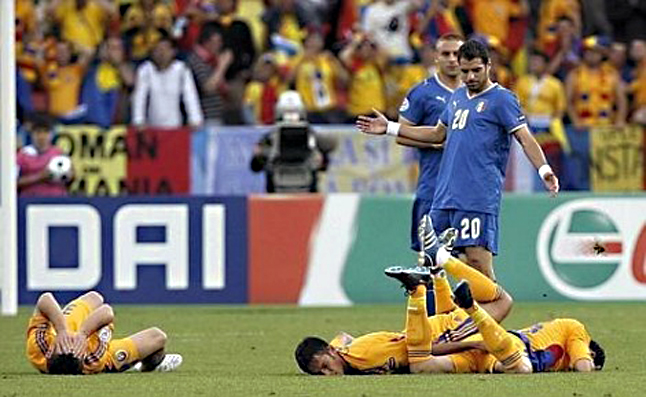

Today marks the commencement of the 14th European Championship in Soccer. For the next three weeks, many local pubs will be broadcasting games and Sports Centre will carry highlights of highly paid athletes shedding tears onto carefully maintained soccer pitches across Poland and the Ukraine.
As the event loomed this past week, conversations amongst sports enthusiasts naturally drifted towards the sport. Interestingly around us, there seemed to be an inherent lack of respect for the game of soccer. No one denies that it is an easily accessible sport that has great physical rewards without costing as much to play as hockey. However, soccer is arguably the most popular sport on the planet, and yet in North America, no one seems to care.
Soccer seems to be the Rodney Dangerfield of sports, never getting respect. Luckily Higher Ground has managed to boil this down to it’s essence. Put aside the lack of money in the sport from endorsements. Soccer in North America will never reach the caliber of the NHL or even NCAA Football for product placement, not to mention the level of money tied into the Superbowl. Nor will we discuss the scheduling issues that compete with NHL or the seasonality of the sport in North America versus the rest of the world. The simple reason why soccer doesn’t get more respect in the North America market is quite frankly because soccer players aren’t tough enough.
North American sports audiences have, like it or not, been raised on a culture of violence and toughness in their sports. Take hockey, football, mixed martial arts, boxing, entertainment wrestling or lacrosse, all of which promote toughness and “taking a hit”. Meanwhile you have soccer, where players are trained to take dives. The more dramatic they make that dive look, the more likely they will draw a penalty against the opposing team. Granted, we see players in some of “our” sports taking dives to draw penalties as well, but let’s face it, no one cries like a professional soccer player. They’re worse than beauty pageant contestants talking about how to end famine and bring about global peace and prosperity.
In the immortal classic film “A League of Their Own”, Tom Hanks said, “There’s no crying in baseball!” Those words can easily apply to soccer. If soccer players the world over want to be taken seriously they need to quit with the tears. Soccer leagues need to stop glorifying plentiful amounts of weeping and start focusing on eliminating these actions from the sport.
Market research conducted within Revelstoke has determined the best way to discourage this practice. Currently, yellow and red cards are given to players for committing various offences. Granted, a yellow card can be given to a player for “unsporting conduct” such as taking a dive or crying on the pitch. However, this hasn’t done anything to discourage the behavior. Perhaps adding an element of shame is what is needed to get these players conduct in order. What we are proposing in an open call to FIFA is the institution of the “pink card”.
In simple terms, the pink card would be reserved for the most obvious displays of on field fragility. When a player takes a clearly false dive: pink card. When a player starts crying to only further the falseness of the dive: pink card. However, unlike other penalty cards that upon accumulation result in expulsion from the game, after 2 pink cards, the player in question will be required to wear an evening gown of the caliber that is usually worn by “Dancing with the Stars” contestants.
There will be some who decry the collective suggestion on improving the game of soccer and will note the obvious gender bias in this column. Well, let’s ask ourselves a very real question, how often do you witness female players crying on the field versus male players? The answer is you don’t. Fact: female soccer players apparently handle themselves much better as the role models professional athletes are expected to be. In the interest of equality however, we propose retaining the “pink card” for incidents of diving and crying amongst female soccer players, but adding the requirement of sporting heavy combat boots and carrying a backpack full of rocks for the remainder of the game.
These new initiatives at first may seem heavy handed. However, it is the assertion of Higher Ground that implementing these strategies will reduce the amount of crying in an otherwise exciting sport. Once that behaviour is weeded out, respect for soccer in North America will no doubt grow in leaps and bounds.



